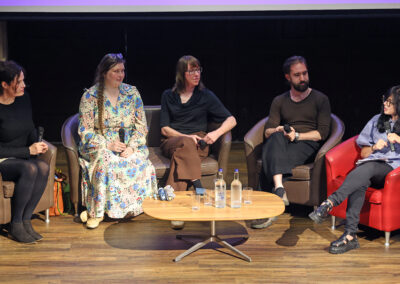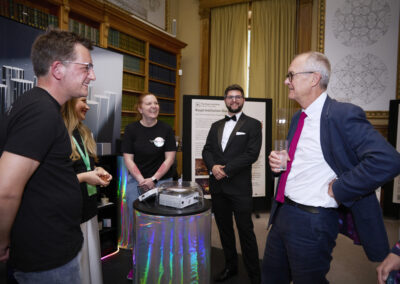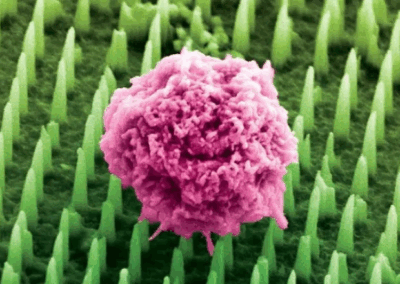LCN researchers at King’s, led by Dr Rafael T. M. de Rosales and Dr Graeme Stasiuk, have been awarded £10 million in funding from the Engineering and Physical Sciences Research Council (EPSRC) to accelerate and optimise the clinical translation of healthcare nanotechnologies.
A groundbreaking UK research initiative is set to revolutionise the future of healthcare nanotechnology, building on the success of life-saving innovations like the Pfizer and Moderna COVID-19 vaccines and other pioneering drugs based on nanotechnologies such as the anticancer drug Vyxeos®. These nanomedicine breakthroughs have already saved millions of lives and opened the door to a new era in nanomedicine, including applications in radionuclide therapy and theranostics – where imaging guides treatment.
Despite these advances, critical questions remain about how nanomaterials behave inside the human body. Where do they travel? How long do they stay? Do they reach their intended targets, such as tumors, or accumulate in unintended organs, potentially causing harm? Until now, most answers have come from animal studies using genetically similar subjects, which fail to reflect the complexity of human biology.
To address these gaps, a consortium of leading UK institutions; King’s College London, the University of Leeds, and Queen Mary University of London, has launched an ambitious programme leveraging a cutting-edge imaging technology: total-body positron emission tomography (TB-PET). This technique enables researchers to track very small amounts of nanomaterials safely throughout the entire human body with unprecedented sensitivity and minimal radiation exposure.
With this funding from the EPSRC, and the multidisciplinary team of researchers that will support, we will be able to understand at an unprecedented level how healthcare nanomaterials behave inside the human body. This knowledge will be transformative in how basic researchers, pharmaceutical companies, and clinicians identify and select the best healthcare nanotechnologies of the future, for the ultimate benefit of patients.
Dr Rafael T. M. de Rosales
The team will develop innovative methods to synthesise and radiolabel nanomaterials with trace amounts of radioactivity, allowing real-time tracking and therapeutic use. This approach overcomes previous limitations posed by radiotoxicity, enabling safer and more effective identification of next-generation nanomedicines.
We are delighted to have received this award from the EPSRC, this landmark research programme unites chemists, biologists, clinicians and technologists across King’s College London, the University of Leeds and Queen Mary University London, to address some of the most pressing challenges in nanomedicine and healthcare diagnostics. At its core the programme will build a platform for novel radiopharmaceuticals and radiolabelled nanomedicine development, focusing on safe and effective translation of these to patients, utilising clinical technology Total Body PET.
Dr Graeme Stasiuk
The programme will cover four key research themes:
- Image-Guided Diagnosis and Drug Delivery– exploiting TB-PET for advancing nanoparticle systems for sensitive cargoes like mRNA, including vaccines.
- Radionuclide Therapy– improve nanoparticles’ tumor-targeting abilities to deliver cancer-killing radiation safely to treat and image.
- Image-Guided Surgery– advancing multimodal imaging nanoparticle systems to enhance surgical precision.
- Combination Therapies– exploit synergies between nanotechnologies with cutting-edge treatments like cell immunotherapy and advanced radiotherapy.
These themes are supported by seven interlinked work packages, covering everything from nanomaterial synthesis and toxicology to clinical translation and public engagement. The programme also emphasises patient and community involvement to ensure research remains aligned with public needs and values.
With access to two clinical TB-PET scanners at King’s College London and a world-class multidisciplinary team, this initiative is poised to accelerate the safe and effective translation of nanotechnology into transformative healthcare solutions, and positively impact patient outcomes.
This story first appeared on the King’s College London website



